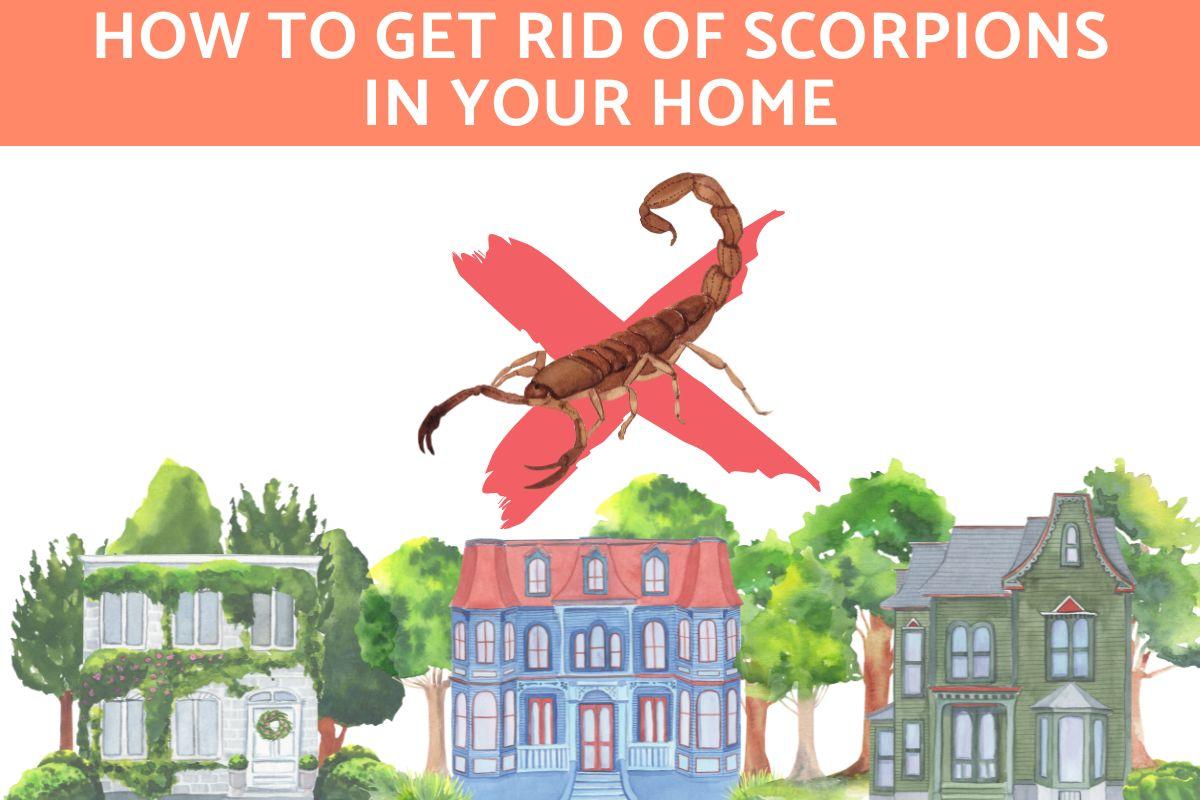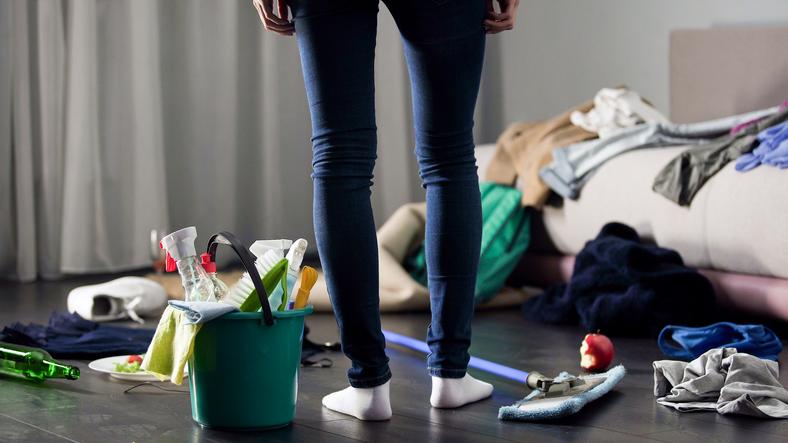How to Get Rid of Scorpions in Your Home Naturally


Scorpions are air-breathing arachnids related to spiders and mites. They are easily recognized by their narrow, segmented tail ending in a stinger. This stinger can inject venom to subdue or kill their prey, and in some species, it can be dangerous to humans. However, scorpions are usually not aggressive towards people. Their main goals are finding shelter, food, and avoiding predators. However, if they feel threatened or trapped, they might sting to protect themselves.
This AnimalWised article explores safe and natural ways to get rid scorpions from your home, along with effective prevention tips to keep them out in the first place.
Are all scorpions poisonous?
Scorpions are eight-legged arachnids with a segmented tail that ends in a stinger. All scorpions possess venom, which they use primarily for hunting prey and self-defense. However, the potency of their venom and its effects on humans vary widely among different scorpion species.
Most scorpions have venom that is not harmful to humans, causing only mild symptoms like localized pain, swelling, or numbness at the sting site.
A small number of scorpion species possess venom that can be dangerous or even fatal to humans. The most notorious among these are species in the family Buthidae, such as the Arizona bark scorpion (Centruroides sculpturatus) and various species of the genera Androctonus, Leiurus, and Tityus. The venom of highly venomous scorpions can cause severe symptoms, including intense pain, muscle spasms, respiratory difficulties, and in extreme cases, death. Children, the elderly, and individuals with compromised health are more susceptible to severe reactions.
Out of the more than 2,500 scorpion species, only about 25 to 30 can deliver a sting strong enough to seriously harm or even kill a human.
What attracts scorpions in the house?
Scorpions are arachnids that inhabit a variety of environments, including deserts, forests, grasslands, and caves. They tend to seek out concealed areas both for hunting and protection. Outdoors, you can find them hiding under rocks, in burrows, or within leaf litter. However, scorpions may also venture indoors, particularly under certain conditions, such as:
- Extreme weather: intense heat, cold, or heavy rainfall can drive them to seek shelter with more stable temperatures and humidity inside homes.
- Habitat disruption: construction, landscaping, or other disturbances to their natural habitats can force them to find new hiding spots indoors.
- Food availability: if your home has a significant population of insects or other small prey, it can attract scorpions looking for a meal.
Once inside, scorpions are likely to seek cool, dark, and moist areas. They might hide in basements, crawl spaces, attics, and garages. Be cautious around shoes, clothing, and bedding left undisturbed, as these can become surprise scorpion hiding spots.
Scorpions are primarily nocturnal hunters, becoming active at night to avoid predators and the extreme daytime heat, especially in deserts. This is the time when you are most likely to encounter them. They are carnivorous and use their pincers to capture prey such as insects, spiders, and occasionally small vertebrates. Their venomous sting serves to immobilize or kill their prey before consumption, and is also used for self-defense.

How do scorpions get inside homes?
Scorpions can find their way into homes through various entry points and conditions that provide access. Here are some common ways scorpions get inside:
- Cracks and gaps: Scorpions can enter homes through small cracks and gaps in walls, foundations, and around doors and windows. Even the tiniest openings can provide access for these agile creatures.
- Vents and ducts: Openings such as attic vents, dryer vents, and air conditioning ducts can serve as entry points for scorpions. Ensuring these are properly screened and sealed can help prevent entry.
- Utility lines: Gaps around utility lines, such as plumbing, electrical, and gas lines, can also provide pathways for scorpions to enter the home. Sealing these entry points is crucial for keeping scorpions out.
- Door and window frames: Scorpions can easily slip through spaces around poorly sealed doors and windows. Installing weather stripping and using door sweeps can significantly reduce their ability to enter.
- Brought inside: scorpions can hitch a ride inside on firewood, plants, or outdoor equipment. They can also hide in luggage, bags, or clothing left outside.
- Sewer and drain pipes: although less common, some scorpions may enter through sewer or drain pipes if there are gaps or damaged seals.
Concerned about your pet's well-being after a scorpion encounter? Learn the signs of a scorpion sting and how to react in our guide.

Natural and organic methods for scorpion control
Compared to traditional chemical pesticides, natural and organic methods offer an alternative approach to scorpion control within your home. These methods prioritize minimizing exposure to potentially harmful toxins and residues, a key benefit for households with children and pets.
Additionally, natural approaches can contribute to a more sustainable environment by reducing chemical pollution and potentially encouraging the presence of natural predators that help control scorpion populations. While cost-effectiveness can vary depending on the chosen method, some natural repellents and the introduction of beneficial creatures can be quite affordable. It's important to note that natural methods may require more consistent application and may not be as fast-acting as chemical solutions.
Here are some readily available natural repellents you can use:
Essential oils
- Lavender oil: this calming scent also deters scorpions. Mix a few drops with water and spray around entry points and hiding spots.
- Cedarwood oil: repels scorpions with its strong aroma. Use it similar to lavender oil.
- Citrus oils: such as lemon or orange, can be used in spray form or by placing peels in strategic locations.
- Peppermint oil: the strong scent discourages scorpions. Dilute it with water and spray around your home for a natural barrier.
Other repellents
- Diatomaceous earth: this powder, made from fossilized algae, dehydrates scorpions and other pests upon contact. Sprinkle it around the perimeter of your home and in cracks and crevices.
- Borax: similar to diatomaceous earth, borax creates a barrier against scorpions. Apply cautiously in scorpion-prone areas, keeping it away from pets and children.
Keep in mind that natural methods may take longer to show results than chemical treatments. Consistent application and reapplication of repellents are crucial.
Also, keep an eye on scorpion activity and adjust your methods as needed. What works in one season or environment might require tweaks in another.

How to scorpion proof your house?
The most effective way to deal with scorpions is to prevent them from entering your home in the first place. This proactive approach involves making your home less attractive and accessible to these pests. Here are some of the most effective things you need to do:
- Regularly inspect your home for cracks and gaps in walls, foundations, and around doors and windows. Pay special attention to areas where utilities enter the house. Use caulk or sealant to close gaps and cracks. For larger openings, consider using expanding foam or other appropriate materials to fill the space completely.
- Install weather stripping around doors and windows to ensure a tight seal. This not only helps keep scorpions out, but also improves energy efficiency.
- Attach door sweeps to the bottom of exterior doors to eliminate gaps that scorpions could crawl through. Ensure the sweeps are in good condition and replace them if they wear out.
- Use fine mesh screens over attic and crawl space vents to block scorpions while allowing proper ventilation.
- Regularly clean up yard debris such as leaves, wood piles, and other clutter that can provide hiding spots for scorpions. Keep the area around your home clear and tidy. Trim grass, bushes, and other vegetation away from the house. Overgrown plants can provide cover for scorpions and serve as bridges for them to enter your home.
- Keep building materials, stones, and other items stored away from the house and off the ground to minimize hiding places.
- Keep your home clean and free of crumbs, spills, and other food sources that can attract insects. Regularly vacuum and wipe down surfaces.
- Repair any plumbing leaks and address moisture issues in your home. Scorpions are attracted to damp areas, so keeping your home dry can help deter them. Use dehumidifiers in basements, crawl spaces, and other areas prone to moisture buildup. This can make these areas less hospitable to scorpions.
- Keep storage areas organized and off the floor. Use plastic bins with tight-fitting lids instead of cardboard boxes to reduce hiding spots. Regularly clean and declutter areas where scorpions might hide, such as closets, under furniture, and in seldom-used rooms.
All these strategies focus on making the home less attractive and accessible to scorpions, creating a safer and more comfortable living environment.
Not all stingers are created equal! Discover the most potent venoms on the planet (and how to avoid them) in this other article.
If you want to read similar articles to How to Get Rid of Scorpions in Your Home Naturally, we recommend you visit our Facts about the animal kingdom category.
de Roodt, A. (2015). Scorpion venom (scorpions) and poisoning. Acta Biochemistry Clínica Latinoamericana, 49 (1), 55-71 Available at: https://www.redalyc.org/articulo.oa?id=53541285007.
Tucto, J. (2020). Natural and homemade scorpion repellents. How to plant. Available at: https://como-plantar.com/repelentes-alacranes/.








